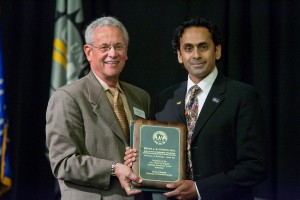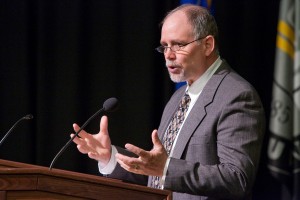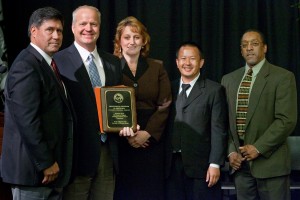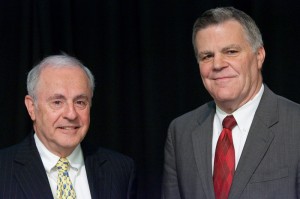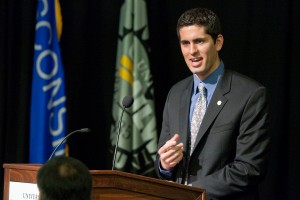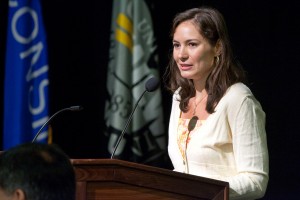MILWAUKEE – The University of Wisconsin System Board of Regents on Friday honored two professors and one academic program for their outstanding career achievements in teaching, as they bestowed the UW System’s highest recognition for members of its faculty and academic staff.
The 2011 recipients of the Regents Teaching Excellence Awards are:
- Craig Berg, Professor of Curriculum and Instruction, School of Education, UW-Milwaukee;
- Regan A.R. Gurung, the Ben J. & Joyce Rosenberg Professor of Human Development and Psychology, UW-Green Bay; and
- The Professional Program in Education, UW-Green Bay.
Regent Betty Womack, who chaired the selection committee, said that this recognition is “a welcome reminder of what a treasure we have in our faculty and academic staff, those who bring that special dedication, creativity, and passion to their craft, and to whom we entrust the education and enlightenment of the citizens of the future.”
- See the UW System news release of May 4.
- For more about the winners, see the Regents Awards website.
Regent Jeff Bartell introduced the first award recipient, Dr. Regan Gurung, a professor of psychology at UW-Green Bay. Dr. Gurung’s self-described goal as a teacher is to “make students realize that they can do better than what they think is their best,” Bartell said. In 2009, Gurung was named the Wisconsin Professor of the Year by the Carnegie Foundation for the Advancement of Teaching. Bartell noted that Gurung has built a reputation not just as an outstanding teacher, but as an outstanding scholar, and he is nationally known for his research and publications on teaching and pedagogy.
“I am proud to be a teacher, and I am very proud to be a part of the UW System,” said Garung. “We’re here for the students. We’re here because we believe that education improves life. I believe that, and that gives me energy.”
Gurung recognized those in the room for the work they do to support teaching, saying,“I am very buoyed by what the Office of Professional and Instructional Development, OPID, does. I salute what they do for faculty to make sure we keep educating, and I thank all of you for the work you do. That helps me know that I can focus on the classroom, and that’s what gives me strength.”
Regent John Drew introduced Dr. Craig Berg, who has been on the faculty in the School of Education at UW-Milwaukee for more than 20 years, where he has focused on building a top-notch science teacher preparation program. Drew also noted that Berg has been an “ardent advocate for improving the lives of urban children and increasing their chances for success,” and has personally invested thousands of hours into fulfilling that mission in the Milwaukee area.
“Although you know we’re expected at this university to be highly productive in terms of scholarship, writing grants, publications, and service, teaching is still the central core of what I want to do, and what I’m expected to do,” Berg said. “It’s the most important part of me being a faculty member at UW-Milwaukee.”
Finally, professor and department chair Timothy Kaufman accepted the program Teaching Excellence Award on behalf of the UW-Green Bay Professional Program in Education.
“This is a program that is firmly grounded in UW-Green Bay’s campus-wide commitment to connecting learning to life,” said Regent Edmund Manydeeds, in presenting the award. He noted that students in the program are provided with rich and varied opportunities to put the theories of education into practice, working with children and families from different ethnic, cultural, and economic groups, as well as children with exceptional educational needs. One of the department’s most recognized initiatives is the “Phuture Phoenix” mentoring program, which encourages at-risk youngsters to pursue a college education.
Kaufman said, ““This is truly a group effort. Our vision and commitment is to produce the teachers of tomorrow, really the greatest profession in the world. Professionals that are not only well prepared, but highly desired by schools and districts. Practitioners who are comfortable and nimble in diverse settings and who are able to adapt and successfully serve the needs of young learners, especially those who are at risk or underserved.”
Regent President Charles Pruitt stresses importance of working together
Outgoing Regent President Charles Pruitt described the Governor’s budget as “not what we were hoping for,” and characterized recent debate as similar to a family argument. “After we’ve cooled down, we return to the dinner table with the realization that we care about the same things, with renewed commitment and the resolve to move on together. “
“What brought us together as a university family is the Wisconsin Idea and a deep and abiding commitment to faculty, staff and students,” said Pruitt. He pointed to “the need to spend time making our case in a strong and united way.”
Pruitt pointed to gains since the UW System was created. “These happened because our predecessors understood what is really important. I would hope it could be said that in this challenging time the Board has an ‘eye on the prize.’ Teaching awards remind us what this enterprise is all about. We at the university do not try to teach the students what to think or how to think, but how to navigate during uncertain and complicated times. We need to give students the ability to problem solve and learn.”
Pruitt concluded by thanking colleagues on the Board as well as Chancellors and others in the System. He termed them “stars of the show,” and said he was in “awe of what you do to manage your campuses, especially in these times.” He added that it has been an honor to serve on the Board of Regents. “We hope we’ve done our best, that our best was good enough.”
President Reilly termed Pruitt an incredible leader, noting the UW System could not have had a more stalwart person at the helm, “helping us work through our ‘family dispute’ to come out to a good place.”
System Presidents Report
UW System President Kevin P. Reilly updated the Board on his President’s Advisory Committee, which he created in April. The committee is charged with addressing issues related to the 2011-13 biennial budget, including the proposal to reduce UW System Administration’s operating budget by 25 percent, and the provision of new administrative and management flexibilities to the Board of Regents.
“We are at a pivotal point in the evolution of the UW System,” Reilly said. “These changes, when taken individually or in combination, are significant. They require careful and strategic consideration if we are to reshape UW System Administration in a manner that preserves what is necessary and effective, sheds what is best done elsewhere or not at all, and considers the opportunities to better serve our core stakeholders – the Board of Regents, the UW System institutions, and all the people of Wisconsin.”
Reilly informed the Board that President Pruitt has agreed to chair the committee. Other members of the Committee will include Regent Jeff Bartell, Regent Judy Crain, Regent Brent Smith, Chancellor Debbie Ford of UW-Parkside, Chancellor Tom Harden of UW-Green Bay, and Chancellor Rick Wells of UW-Oshkosh, among others.
He told Regents that he is requesting the committee to advise him on potential changes in the structure, function, and support of System Administration, including operations currently assigned to both System Administration and Systemwide accounts. These considerations should be made within the context of the UWSA mission statement, the proposed 25% reduction in base funding, and the new management flexibilities under consideration, he said.
Reilly plans to use the committee’s recommendations to shape his own considerations and will engage Regents in further discussion of these issues before the end of the summer.
As part of his report, Reilly also updated the Board on recent visits that he and President Pruitt had with members of the Wisconsin’s Congressional delegation in Washington, D.C.
Reilly spoke to “the inordinate impact that cuts to financial aid and scientific findings would have on our students and research.” He called for Wisconsin Legislators to support Pell Grants, since the suggested cuts would result in fewer students with financial need being able to pursue higher education. “With the present economic situation, these cuts could not come at a worse time,” said Reilly.
Reilly pledged to continue to work with other sectors of Wisconsin education on legislation that would increase regulations. He did cite a favorable ruling from Veterans Affairs regarding the federal Post 9/11 G.I. Bill and Wisconsin G.I. Bill, indicating vets can use their Federal benefits before tapping their Wisconsin benefits. (All of the legislators in the Wisconsin delegation supported this.)
Reilly mentioned a leadership development workshop for department chairs that was held earlier in the week and sponsored by the UW System. “These are truly unsung leaders for their campuses,” said Reilly. He thanked the partners who organized the workshop and the chairs for their participation. “The Chancellors felt strongly that this was needed and worthwhile. This effort speaks to the benefit of working together on challenges and opportunities.”
Reilly also took a moment to clarify the role of Chancellors in dealing with the issue of in-state tuition for Wisconsin students who are undocumented. News reports after yesterday’s meeting indicated that Chancellors would have the flexibility to offer significant tuition breaks to certain students, even if the provisions in the proposed state budget eliminate the practice of allowing them in-state tuition.
Reilly noted that “It is our intent to comply fully with the letter and the spirit of this law, if it is passed.” Chancellors and university/college financial aid departments could provide supplemental financial aid to such students, just as they would for any other student in need of financial aid, but he noted that financial aid would not be “earmarked” for any group.
Read President Reilly’s full statement to the Board
New Board leadership is elected
Regent Michael J. Spector was elected the new President of the University of Wisconsin System Board of Regents. Spector, who had served as Board Vice President for the last two years, was elected by a unanimous vote of the Board. He succeeds Charles Pruitt in the position.
Regent Mark Bradley of Wausau, who nominated Spector for the position, said Spector combined a “mastery of facts, fairness and an inclusive and respectful leadership style.”
Spector has been on the Board of Regents since 2005. He worked for 36 years with Quarles & Brady, Milwaukee, where he served as chair and managing partner before his retirement in 2002. Spector previously served as an Associate Deputy Attorney General of the United States, and as chair of former Governor Jim Doyle’s Task Force on Educational Excellence. He is currently a Boden Visiting Professor of Law at Marquette Law School, a Director of the Bradley Center Sports and Entertainment Corporation, and the Executive Director of the United States Law Firm Group. He is also a member of the Greater Milwaukee Committee and the UW Pathways to Excellence Board of Visitors. Spector earned his bachelor’s degree from UW-Madison, his law degree from Harvard University Law School, and attended the London School of Economics.
The Regents also elected Brent P. Smith of La Crosse as Board Vice President in a 12-5 vote. Michael Falbo of Hartland was also nominated for the position of Vice President.
Smith is an attorney with Johns & Flaherty in La Crosse. He has served on the State Public Defender Board and the Wisconsin Federal Nominating Commission for Federal Judges.
In other business, the Board:
- Approved resolutions of appreciation for Student Regent Aaron Wingad, whose two-year term is expiring, and Student Regent Emerita Jessica Schwalenberg;
- Approved a resolution of appreciation for UW-Milwaukee;
- Approved seven new academic programs: the Bachelor of Professional Studies in Organizational Leadership and Communication at UW-Eau Claire; Bachelor of Business Administration in International Business at UW-Eau Claire; the collaborative Bachelor of Arts in Japanese Studies at UW-Oshkosh and UW-Whitewater; the Collaborative Online Bachelor of Science in Health and Wellness Management at UW-La Crosse, UW-River Falls, UW-Stevens Point, and UW-Superior; the Online Master of Science in Organizational Change Leadership at UW-Platteville; the Online Master of Science in Integrated Supply Chain Management at UW-Platteville; and the Online Master of Science in Distance Education Leadership at UW-Platteville;
- Approved the 2011-12 proffer from the Trustees of the William F. Vilas Trust Estate in support of scholarships, fellowships, professorships and special programs in arts and humanities, social sciences, and music at UW-Madison and UW-Milwaukee;
- Approved the removal from the Regent Policy Documents (RPDs) of 14-1, addressing “Nondiscrimination in Oratorical Contests;”
- Accepted the annual Report on Promotions and Tenure Designations;
- Approved a resolution delegating authority to appoint and set the salary of several very specific titles from the UW System President to the respective Chancellors overseeing these areas. The resolution also similarly delegates authority to approve named professorships and extensions of non-medical leaves of absence beyond five years;
- Approved a clinical trial agreement between the UW-Madison and Pharmacyclics, Inc.;
- Approved the annual budget of $5.2M for HRS implementation plan in FY2012.
- Approved UW Colleges’ request for authority to release a 0.764 acre parcel of land from the UW-Barron County lease back to its owner, Barron County, so the parcel can be sold;
- Approved UW-Madison’s request for authority to seek a waiver of s. 16.855, Wis. Stats., to allow selection through a Request for Proposal process of a construction manager-at-risk for the Badger Performance Center project;
- Approved UW-Madison’s request for authority, contingent upon enumeration, to seek a waiver to allow single prime bidding for the University Ridge All Seasons Golf Practice Facility project and to construct the project at an estimated cost of $2,800,000 Gift Funds;
- Approved UW-Whitewater’s request for authority to construct the Carlson Hall Renovation project at an estimated cost of $17M General Fund Supported Borrowing, contingent upon enumeration of the project in the 2011-13 Capital Budget;
- Approved a request by the staff of UW System for seven All Agency Maintenance and Repair projects at six UW System institutions totaling $6.6M;
- Approved the Bachelor of Applied Arts and Sciences Degree;
- Approved the revised UW System Policy on Transfer; and
- Approved UW Colleges’ revised mission.
Kathy Quirk and Beth Stafford contributed to this report.
Photo credit: UW-Milwaukee photographer, Alan Magayne-Roshak
###
The UW System Board of Regents will hold its next meeting July 14-15, 2011, in Madison
Supporting Materials
Board of Regents President Chuck Pruitt’s Farewell Speech
“I wanted to use my final report to the Board to offer a few reflections on the journey we’ve been on over the last year. It was a year ago last July that Jay Smith and I authored a paper entitled “Principles for Progress and Prosperity.”
Jay and I offered no earthshaking or dramatically different observations than many of us and many of our predecessors on this Board have been making for many years now. We talked about Wisconsin being at a crossroads.
We know that to thrive in a global economy where innovation and knowledge are vital, our state needs more college graduates and more jobs. We also know that the people in the University of Wisconsin System – all our campuses and all our faculty and staff – are ready, willing and able to help on both counts.
We talked about how the business model between the state and the university was a broken business model.
We urged candidates and office holders to reinvest in the university as an engine for economic growth.
We encouraged a new commitment to financial aid so we can educate more low- and moderate-income students, and free their families from crushing debt burdens.
And we called for new management flexibilities that would enable our chancellors to manage their campuses more effectively, pay their employees more competitively, and make limited dollars go further.
When the Governor’s budget was introduced last February, I think it would be fair to say that it was not exactly what we were hoping for.
As I was thinking about the journey of the last four months, I recalled that one of my favorite quotes from Robert Kennedy is when he was reflecting about the Gross Domestic Product and all that it measures and all that it does not.
Kennedy lamented that while the Gross Domestic Product measures many things, it “does not allow for the health of our children, the quality of their education, or the joy of their play. It does not include the beauty of our poetry or the strength of our marriages; the intelligence of our public debate or the integrity of our public officials.”
“It measures,” Kennedy concluded, “neither our wit nor our courage; neither our wisdom nor our learning; neither our compassion nor our devotion to our country. It measures everything, in short, except what makes life worthwhile. And it tells us everything about America except why we are proud that we are Americans.” (Unquote)
Our debate over the last months about governance and boards and separations reminds me a bit of Kennedy’s view of the Gross Domestic Product. This debate has been about many things, but not about the most essential things that really matter.
I hope we can take the opportunity now to get back to those essential things.
Because the ties that bind us are far stronger and more enduring than whatever short-term arguments or disagreements that may temporarily divide us.
In recent months, we’ve had a bit of a family argument. I don’t know about your family but mine has lots of them. And after we’ve cleaned up the broken dishes and cooled down in whatever rooms we stormed off to, we return to the dinner table with a renewed appreciation for our commitment to each other, a recognition that we care about each other and a realization that to move forward as a family, we have to understand that we are all in this together.
The same is true here. What brought us together as a University system and a university family 40 years ago – and what will hold us together in the next 40 years – is the Wisconsin Idea, and a deep and abiding commitment to the 182,000 students and 30,000 faculty and staff who depend on us.
It is time now to move forward and understand and appreciate that central commitment. And I sincerely hope we will spend far more time in the months and years ahead in making our case, in a strong and united way, for the central role this university can play in the life of our state and the lives of our students.
We need to commit to speaking clearly and in one voice to the state and all our stakeholders, that continued deep cuts in state support are a short-sighted strategy for our state and our students. We need to get back to what is really important – making the case for why the state needs to reinvest in its public university system.
Ten years ago, students and their families paid 38% of the cost of their education. Today, they pay 60%, and at a time when we need to be educating more and more low- and moderate-income students, that trend is unsustainable.
We all know that the compensation for our world-class faculty, staff, and academic leadership does not measure up to the competitive national and international markets within which we compete. We will lose more and more talented members of the academic community unless we make our case and turn these trends around.
On October 8th, 1971, Governor Pat Lucey signed the legislation creating the University of Wisconsin System and he said, “This is the beginning of a new era in the education of Wisconsin’s young people. Merger is now a reality and we will all benefit because of it, through the new University of Wisconsin System.”
Forty years later, anyone would be hard pressed to say Pat Lucey got it wrong. UW-Madison has become one of only four public universities in the top 20 universities in the country. UW-Milwaukee, as we have learned anew in the last two days, is on a startling and exciting upward trajectory. UW-Oshkosh, Stevens Point, Green Bay, Stout, and all our other campuses are unrecognizable today from where they stood 40 years ago.
This did not happen by accident. It happened because the union was strong, it happened because we all stood together, it happened because our predecessors understood what really matters.
The last four months have been interesting ones indeed, but they have renewed my faith in both the importance of this mission and the critical need for us to stand together.
I would hope it could be said that in these most challenging of times, this Board of Regents, these Chancellors and this System President kept the faith. We stayed the course, we shared our commitment to a simple but powerful idea – the Wisconsin Idea – and to a vision Pat Lucey worked so hard to realize 40 years ago.
Dr. King used to remind us all about how important it was that we “keep our eyes on the prize.” In a few minutes, we will honor the recipients of the Regents Awards for Teaching Excellence. It reminds us all what this enterprise is really all about and it’s the prize that we ought to be keeping our eyes on in the months and years ahead.
I had the privilege of serving on the Teaching Awards selection committee when we chose John Koker from UW-Oshkosh. We’ve kept in occasional contact over the years and, in the midst of our efforts a couple months ago, John sent me an op-ed piece he submitted to the Oshkosh Northwestern.
In it, he wrote the following:
“If nothing else, recent events in our state have more than ever heightened awareness and solidified the consensus regarding the precious value of education. We at the University do not try to teach students what to think; rather we strive at every turn to teach them how to think.
“We use the power of arts, the humanities, the sciences and the social sciences to present students with the knowledge and skills to navigate through these complicated and uncertain times. No one wants to leave our children and grandchildren in debt. Simply leaving them debt free, however, with no means to think critically, problem solve and learn is a short-sighted goal, one that may make us feel better now but leaves the future population unequipped to deal with issues that seem eternal.” (Unquote)
John Koker has his eyes on the prize in Oshkosh. I’d hope all of us can add our eyes to his in the days ahead.
I want to conclude by simply offering my own deep and heartfelt thanks.
First, to my colleagues on this Board who stood together, unified and with one voice. That unity and your commitment made everything else possible. And I want to especially thank Mike Spector whose wise counsel, brilliant mind and steady hand have been invaluable over the last four months and the last two years.
To our President Kevin Reilly, who demonstrated once again just how fortunate all of us and all of Wisconsin are to have him at the helm of this university system.
To the System staff – I started to compose a list and it got so long that I was sure I was leaving someone out so let me just thank you all.
I do want to specially acknowledge Jess Tormey, who played a vital role in shuffling between lots of offices in the Capitol over the last four months.
And, for the last year and a half, a special thanks to Jane Radue and her team. Two weeks into my term as President, I somehow managed to do what 12 other Presidents failed to do – I chased Jude Temby into retirement. We miss Jude but Jane Radue and her team haven’t missed a beat and their support of all of us is really quite remarkable.
And to our Chancellors and Deans – you are the stars of this entire show. Talk about standing together… I am in awe and so deeply appreciative of all you do in the most difficult times to lead your campus and what you have done in the last four months to preserve this 40-year union. That work will, I believe, be something for which you can take great and enduring pride.
So this concludes my last Report as President. It has been an honor to serve. In looking back, I can only promise that we did our best and, especially given the importance of this cause, I hope our best has been good enough.
Thank you.

